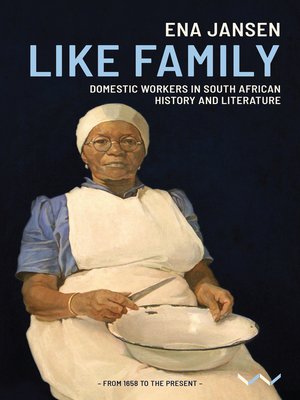
Sign up to save your library
With an OverDrive account, you can save your favorite libraries for at-a-glance information about availability. Find out more about OverDrive accounts.
Find this title in Libby, the library reading app by OverDrive.



Search for a digital library with this title
Title found at these libraries:
| Library Name | Distance |
|---|---|
| Loading... |
More than a million black South African women are domestic workers. These nannies, housekeepers and chars continue to occupy a central place in in postapartheid society. But it is an ambivalent position. Precariously situated between urban and rural areas, rich and poor, white and black, these women are at once intimately connected and at a distant remove from the families they serve. 'Like family' they may be, but they and their employers know they can never be real family. Ena Jansen shows that domestic worker relations in South Africa were shaped by the institution of slavery at the Cape. This established social hierarchies and patterns of behaviour and interaction that persist to the present day, and are still evident in the predicament of the black female domestic worker. To support her argument, Jansen examines the representation of domestic workers in a diverse range of texts in English and Afrikaans. Authors include André Brink, JM Coetzee, Imraan Coovadia, Nadine Gordimer, Elsa Joubert, Antjie Krog, Sindiwe Magona, Kopano Matlwa, Es'kia Mphahlele, Sisonke Msimang, Zukiswa Wanner and Zoë Wicomb.. Later texts by black authors offer wry and subversive insights into the madam/maid nexus, capturing paradoxes relating to shifting power relationships. Like Family is an updated version of the award-winning Soos familie published in 2015 and the highly-acclaimed 2016 Dutch translation, Bijna familie.|More than a million black South African women are domestic workers. These nannies, housekeepers and chars continue to occupy a central place in South African society. But it is an ambivalent position. Precariously situated between urban and rural areas, rich and poor, white and black, these women are at once intimately connected and at a distant remove from the families they serve. 'Like family' they may be, but they and their employers know they can never be real family. Ena Jansen offers a historical perspective that shows how domestic worker relations in South Africa were shaped by the institution of slavery at the Cape. To support her argument, Jansen examines the representation of domestic workers in a diverse range of texts in English and Afrikaans. Later texts by black authors offer wry and subversive insights into the madam/maid nexus, capturing paradoxes relating to shifting power relationships. Soos familie, the award-winning Afrikaans predecessor of the updated Like Family, was published in 2015 and the highly-acclaimed Dutch translation Bijna familie in 2016.







